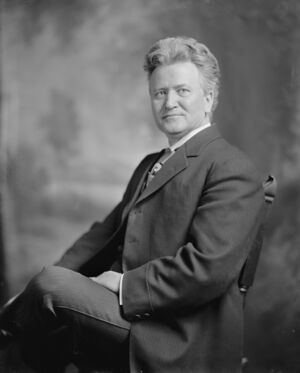Robert La Follette
( politician) | ||||||||||
|---|---|---|---|---|---|---|---|---|---|---|
 | ||||||||||
| Born | June 14, 1855 | |||||||||
| Died | June 18, 1925 (Age 70) | |||||||||
| Citizenship | US | |||||||||
La Follette stated that his chief goal was to break the "combined power of the private monopoly system over the political and economic life of the American people"
| ||||||||||
Robert Marion "Fighting Bob" La Follette Sr. was an American lawyer and politician. He represented Wisconsin in both chambers of Congress and served as the 20th Governor of Wisconsin. A Republican for most of his life, he ran for president of the United States as the nominee of his own Progressive Party in the 1924 presidential election. Historian John D. Buenker describes La Follette as "the most celebrated figure in Wisconsin history".[1]
Born and raised in Wisconsin, La Follette won election as the Dane County District Attorney in 1880. Four years later, he was elected to the House of Representatives, where he was friendly with party leaders like William McKinley. After losing his seat in the 1890 election, La Follette embraced progressivism and built up a coalition of disaffected Republicans. He sought election as governor in 1896 and 1898 before winning the 1900 gubernatorial election. As governor of Wisconsin, La Follette compiled a progressive record, implementing primary elections and tax reform.
La Follette won re-election in 1902 and 1904, but in 1905 the legislature elected him to the United States Senate. He emerged as a national progressive leader in the Senate, often clashing with conservatives like Nelson Aldrich. He initially supported President William Howard Taft, but broke with Taft after the latter failed to push a reduction in tariff rates. He challenged Taft for the Republican presidential nomination in the 1912 presidential election, but his candidacy was overshadowed by that of former President Theodore Roosevelt. La Follette's refusal to support Roosevelt alienated many progressives, and, though La Follette continued in the Senate, he lost his stature as the leader of that chamber's progressive Republicans. La Follette supported some of President Woodrow Wilson's policies, but he broke with the president over foreign policy. During World War I, La Follette was one of the most outspoken opponents of the administration's domestic and international policies.
With the Republican and Democratic Parties each nominating conservative candidates in the 1924 presidential election, left-wing groups coalesced behind La Follette's third-party candidacy. With the support of the Socialist Party, farmer's groups, labor unions, and others, La Follette briefly appeared to be a serious threat to unseat Republican President Calvin Coolidge. La Follette stated that his chief goal was to break the "combined power of the private monopoly system over the political and economic life of the American people",[2] and he called for government ownership of railroads and electric utilities, cheap credit for farmers, the outlawing of child labor, stronger laws to help labor unions, and protections for civil liberties. His diverse coalition proved challenging to manage, and the Republicans rallied to claim victory in the 1924 election. La Follette won 16.6% of the popular vote, one of the best third party performances in U.S. history. He died shortly after the presidential election, but his sons, Robert M. La Follette Jr. and Philip La Follette, succeeded him as progressive leaders in Wisconsin.
References
Wikipedia is not affiliated with Wikispooks. Original page source here